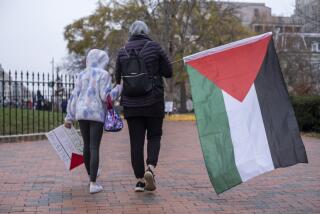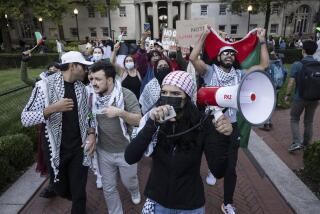Minority of One
- Share via
A cultivated and scholarly man, fluent in three languages, an accomplished pianist, the author of 10 books including one on Joseph Conrad, a professor of literature at Columbia University, is seen by many Americans as a pariah and by others as heroic and inspiring. The sin of Edward Said is that he has persisted in writing about the punishing scarred lives of Palestinians as well as a vast body of scholarship on the Muslim Orient so often defined as being “other” than the Occident that it has been rendered inferior. Said, who as a boy in 1947 left West Jerusalem, where his father, his grandfather and several generations before them had lived, is seemingly undefeated by the animus of others. This patrician and highly productive scholar refuses to let Americans see all Arabs as malevolent, murderous, dishonorable and backward.
The fixed perceptions of Muslims, our ignorance and national revulsion toward Islam, the new enemy, are the crucial themes in a revised edition of his 17-year-old book, never needed so much as now, “Covering Islam: How the Media and the Experts Determine How We See the Rest of the World.”
“It is only a slight overstatement to say that Muslims and Arabs are essentially covered, discussed, apprehended either as oil suppliers or as potential terrorists. Very little of the detail, the human density, the passion of Arab-Muslim life has entered the awareness of even those people whose profession it is to report the Islamic world. What we have instead is a limited series of crude, essentialized caricatures of the Islamic world presented in such a way as, among other things, to make that world vulnerable to military aggressions,” he writes.
This situation has worsened since he first wrote the book in 1981, with the intense focus on Muslims and Islam and the accompanying commentary and analysis by the unqualified. In the book’s new foreword, Said writes: “Malicious generalizations about Islam have become the last acceptable form of denigration of foreign culture in the West. What is said about the Muslim mind, or character, or religion, or culture cannot now be said in mainstream discussion about Africans, Jews, other Orientals or Asians.” If Americans tend to think of Muslims as only those men who blew up the U.S. military quarters in Saudi Arabia or the embassies in Africa, Said would also have us bear in mind “the staggeringly varied geographical circumstances of Islamic societies (from China to Nigeria, from Spain to Indonesia, from Russia to Afghanistan to Tunisia).” But he does not gloss over the appalling events that have happened nor does he trivialize their repercussions. Rather, he hopes to teach us the political implications when the media and the “experts” lump Muslim countries together as identical undesirables, ignoring their considerable numbers, past, present and future, the sheer historical venture of Islam and the varied traditions, societies, languages and cultural formations of Muslims.
It may be a losing battle on his part, but Said thinks not. Even when there is a strong orthodoxy of interpretation among Muslims, there can be revolutionary turmoil, Said notes, as in Sunnite Islam. Sunna means orthodoxy of interpretation based on consensus. But Said reminds us of the conflict between the government in Egypt of the late Anwar Sadat, who with his followers claimed to be the party of true Sunna, and the various so-called fundamentalist opponents made the same case.
“There can be no Islam without the Koran,” Said writes. “Conversely there can be no Koran without Muslims, reading it, interpreting it, attempting to translate it into institutions and social realities.”
There is not one frozen Islam, predictable and locked in itself. All throughout the Islamic world surge varieties of Islam, many Muslims laying claim to guiding their memories back to “the true Islam.” Quite correctly Said makes his case that very little of this diverse Muslim energy is noticed, let alone understood, by the Western media. He is equally derisive about certain scholars and the credentials of those commentators who have made an industry of appearing on television to “explain” terrorism in all its forms. He criticizes the use of “fundamentalists,” a word almost automatically associated with Islam although it has a flourishing relationship with Christianity, Judaism and Hinduism.
“Covering Islam” is not a dated book, and re-reading “Chapter 2: The Iran Story,” which relates how American hostages were held in the U.S. embassy in 1979--a situation that Said deplored--it is clear how little understanding existed of Iranian opposition to “our Shah,” Mohammed Reza Pahlavi, on his Peacock Throne where we anchored him. Some American commentary on the hostage-taking from that time now seems ludicrous. Said quotes from the Wall Street Journal’s editorial that “civilization receding” came from the “decline of the Western powers that spread those [civilized] ideals to begin with.” Not being Western--the fate of most of the world’s population, Islam’s included--is not to have any civilized ideals. Iran was a far more complex story than what was suggested by the television images of the mobs outside the U.S. embassy. Said praises the insightful dispatches of Eric Rouleau of Le Monde, who knew the area well and was not rotated around the world as frequently as American correspondents.
Said was a member of the Palestine National Council, the parliament in exile, as of 1977, but resigned to show his disgust with Yasser Arafat’s disastrous backing of Saddam Hussein during the Gulf War and because of his own poor health. He made his objections known to the Oslo Peace Accords, which he considers a very bad deal for the Palestinians, and has never been defeated by discouraging developments or kept his silence. He believes that American reporting on Israel lacks rigor and fairness. Israel’s security in American eyes, he writes, has become conveniently interchangeable with fending off Islam. It is this particular kind of criticism that has made him hated.
His most famous book, “Orientalism,” was a very detailed and disturbing analysis of centuries of scholarship that takes the late 18th century as a starting point. “The Orient that appears in Orientalism, then, is a system of representation framed by a whole set of forces that brought the Orient into Western learning [and] Western consciousness,” Said writes. It is a school of interpretation, a body of beliefs, ideas and, often, cliches marked by a sense of supremacy. Said attacked the famous senior Orientalist, Bernard Lewis, for circulating many of the vast platitudes to account for the behavior of every Muslim, which he finds not only a form of condescension but also a manifestation of cultural domination. Three years after the publication of this book in 1979, Lewis published his long response in the New York Review of Books accusing Said of “neglect--or perhaps ignorance--of Arab scholarship, and other writings.”
Said has other critics, among them his old friend Arafat and others who are in his own entourage. In a beautiful and haunting article, “Lost Between War and Peace,” an account of his trip to Arafat’s Palestine with his son, Wadie, published in the London Review of Books, Said found intimidation and lostness. He refused to see or speak with Arafat. Then, after his departure, by order of the minister of information, security men appeared in all Gaza and West Bank bookshops to confiscate every one of Said’s books. “I am now banned in Palestine for having dared to speak out against our own Papa Doc,” he wrote.
More to Read
Sign up for our Book Club newsletter
Get the latest news, events and more from the Los Angeles Times Book Club, and help us get L.A. reading and talking.
You may occasionally receive promotional content from the Los Angeles Times.








